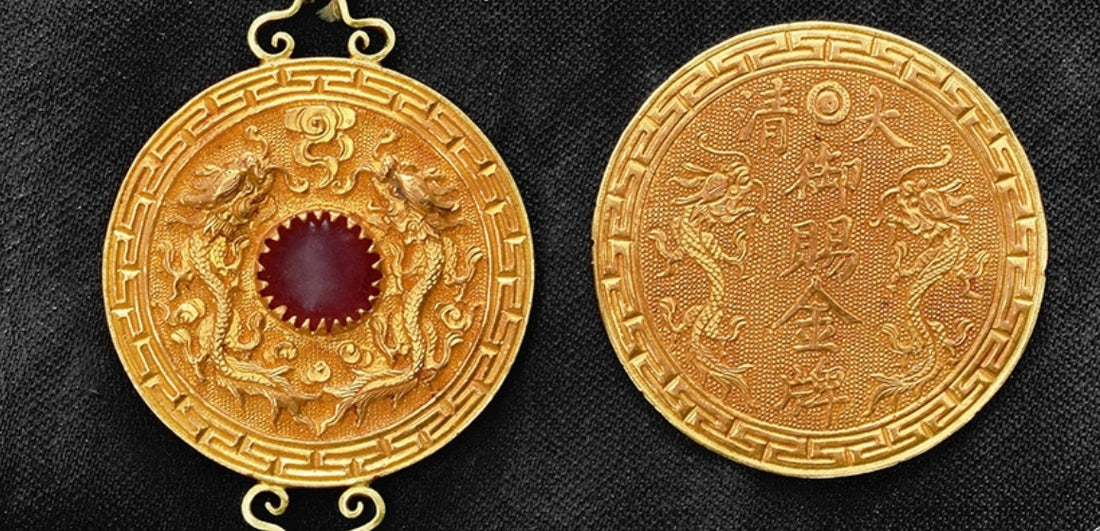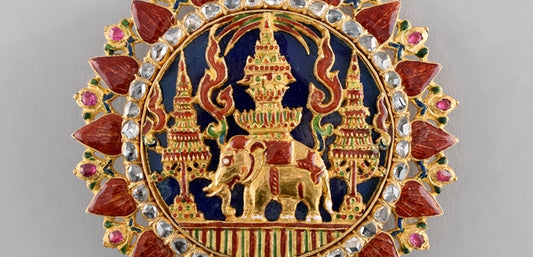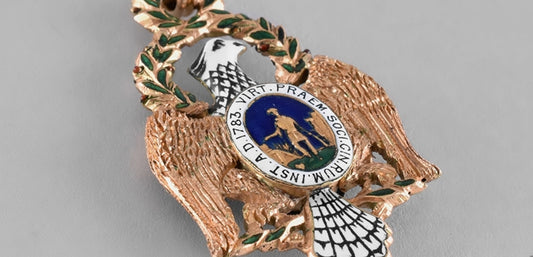Sold in 2021 for $120,000 USD, the Bao Xing Merit Medals of Professor Heinrich Dubus of the Royal Naval College was an industry first. The focus of extensive in-house research and analytical work, this exceedingly rare precursor of the Order of the Double Dragon added to the growing interest and study of Imperial Chinese orders.
In 24ct Gold, and of the highest hand crafted quality and attention to detail with all figures, design, and characters hand carved from a single Gold disc, obverse depicting two dragons pursuing a central red cabochon denoting a first class award, outer border in a stylized "Thunder Scroll" design, reverse featuring Chinese characters stating Da Qing Yu Xi (Great Qing Imperially Awarded First Class Award), measuring 38.4 mm (w) x 54 mm (h - inclusive of Gold 'Thunder Scroll' suspension), 46.6 grams with a remarkably complete and intact tassel set which features a green braided knot (Yun Tou or Cloud Head knot) with parallel blue and red tassels, upper suspension composed of a secondary braided blue Yun Tou, over all near mint and extremely rare representing 1 of only 40 Gold medals issued. Accompanied by the possibly unique matching Gold Medal of the Order not previously seen on the Medals & Orders market, in thin die struck 24ct Gold (tested) depicting two dragons circling central Chinese stylized characters stating "Da Qing Yu Xi (Great Qing Imperially Awarded First Class Award), with "Thunder Scroll" border, measuring 41 mm (d), 11.3 grams, with minor edge knock from previous mounting, otherwise extremely fine.
Attributed to Professor Heinrich Dubus for his contributions to Chemistry at the Royal Naval College, Greenwich. Born on July 13, 1824 in Wolfhagen near Kassel (central Germany). Beginning in 1838, he attended the Polytechnic School of Kassel where his chemistry teacher was Robert Bunsen, who later became one of the most influential German chemists. Debus eventually followed Bunsen to the University of Marburg in 1845, where in 1847 Debus became a licensed private teacher and Bunsen’s assistant. In November of 1848 Debus graduated as doctor of philosophy. Around this time he became friends with Edward Frankland and John Tyndall, also studying in Marburg, who went on to become a famous chemist and experimental physicist, respectively. Due to their influence, after earning his PhD in 1851, Debus moved to England, taking up residence there for the next 37 years. At the recommendation of Frankland and Tyndall, Debus succeeded the latter as a chemistry teacher at Queenwood College in Hampshire, remaining in this position until 1867. During this time he was elected a Fellow of the Chemical Society in 1859 and of the Royal Society in 1861. After leaving Queenwood, Debus taught as science master at Clifton College for the next three years, before being appointed chemistry lecturer at the medical school of Guy’s Hospital in London. Between 1871 and 1874 he acted as vice president of the Chemical Society. In 1873 Debus additionally became a professor of chemistry at the Royal Naval College, Greenwich. He retained this position until his retirement in 1888. Debus then moved back to Kassel in Germany, yet kept ties to England through friends and societies, revisiting the country at least once a year. Debus died on December 9, 1915 at the age of 91.




